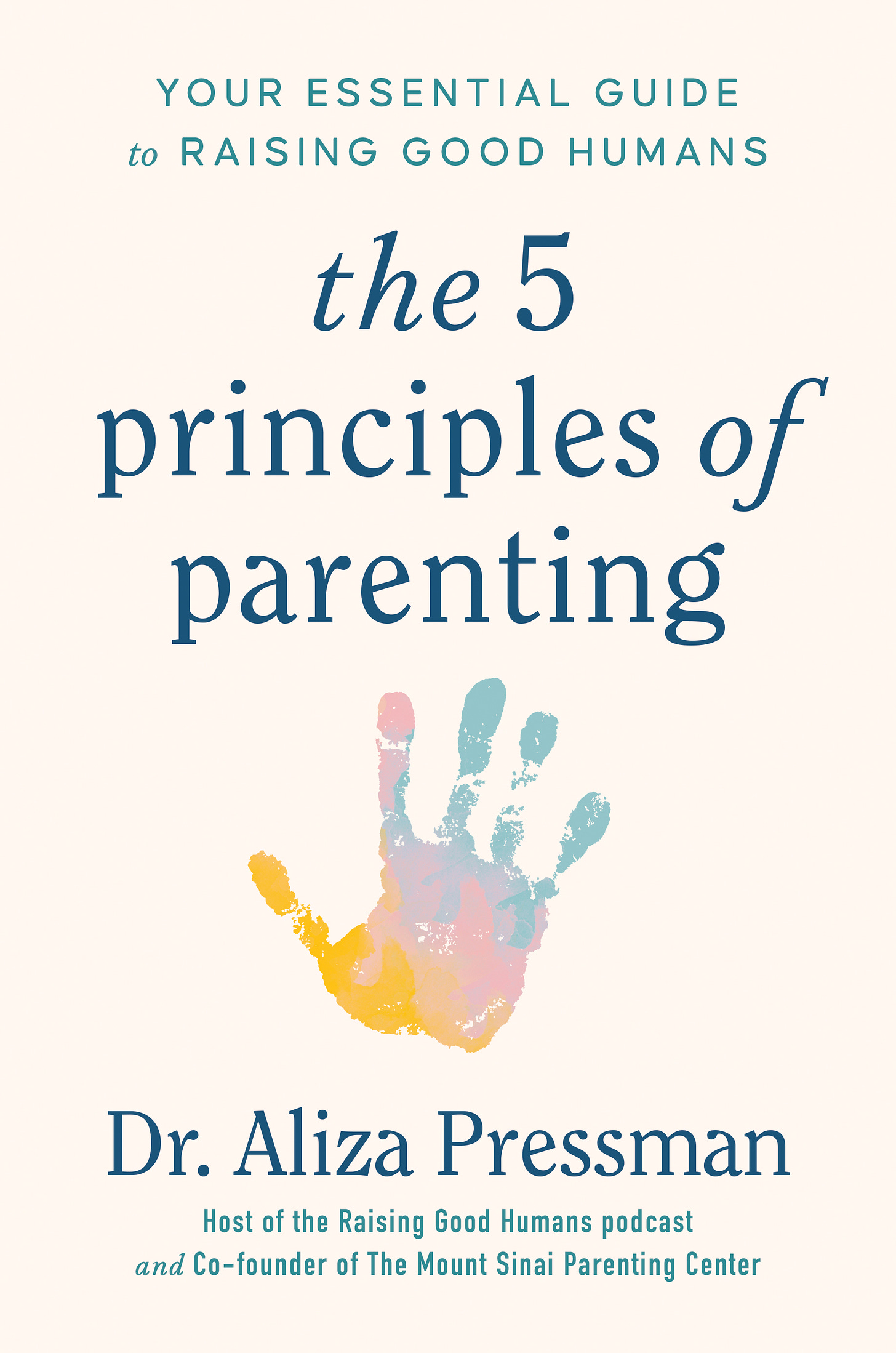My Recent “House call” with Surgeon General Vivek Murthy
Why parent mental health is essential for our kids
Thanks for reading Raising Good Humans on Substack! My first book, The Five Principles of Parenting: Your Essential Guide to Raising Good Humans is now available for purchase here.
This month, I had the privilege of being a guest on House Calls with Dr. Vivek Murthy, the podcast hosted by physician and Surgeon General of the United States, Vivek Murthy (in case that wasn’t clear). Dr. Murthy has been a tireless advocate for America’s children, around issues like loneliness and mental health, and sounded the alarm for additional advocacy to protect young people from the impact of social media. His podcast (which I HIGHLY recommend) aims to provide healing through conversation and connection.
In the episode, I talked about feeling both overwhelmed and delighted by our role as parents! I am heartbroken by parents constantly giving apologies for complaining about the stress of parenting. So often, parents come to me and say something like, “This is so hard,” followed by, “But I know I am so lucky and have wonderful kids and I shouldn’t complain.” Why do we feel this way? How have we been misled to think that parenting is not allowed to be both hard and joyful? How can we name this experience?
Of course, it is natural for all of us to want to be perfect parents. How can we think about the importance of this job and not want to be perfect? That would be too hard for us developmentally. But instead of seeking perfection, can we see the gifts of imperfection for our kids? This is something I have written about before here and here, but being perfect (even if you could) places tremendous pressure and burden on our kids. It doesn’t do for them what we hope it will achieve - an easier and happier life - and it takes a toll on our mental health and capacity, too.
A parent’s mental health IS crucial to their child’s mental health. Our children, quite literally, borrow our nervous system through co-regulation. They learn how to handle the world and manage emotions through their connection with us and how we respond and attend to their young nervous system. That means that you want your nervous system to be in good enough shape to lend out. To be one that practices good regulation skills when we can (we all fly off the handle at times), and has enough support and care of its own to be a well-oiled machine. This doesn’t mean that we have to have perfect mental health, but instead that we use our own awareness of our mental health, and our own growth journeys, to inform our parenting and our relationships. As we say at the Mount Sinai Parenting Center, “parents are born alongside their children”. We are evolving and growing alongside our children. Think about the different stages of development, from infancy to toddlerhood, then elementary school to middle school, teenagers to young adults. Until you have a child in all of these stages, you don’t really know what that experience is like (and with multiple children you learn that you never really know, because each child is so different). Even studying this work as a professional, before I had children, and in real time as I grow my own, I know that it isn’t the same when you are doing it, as it seems in a book or laboratory. That’s why this journey requires grace and forgiveness, imperfection and growth, and a healthy perspective on what really matters - showing up each day with the intention to try. To be there for our children no matter what, and to give them what we can of ourselves each day. This is what Dr. Murthy describes as a warm blanket of unconditional love that he felt from his parents.
What so often interferes with our ability to show up in these moments is our own issues with self-regulation. Think of the moments where your nervous system reacts before you can think of an intentional response. Where you yell before you meant to, clenched your fist, or got red in the face. Now imagine a world in which you can pause just long enough to make an intentional choice about how to react. You may still yell, but you’ll do so because you wanted to and not because it was an accident. Self regulation really matters - for you, and for your children. If we can invest in our own capacity to self regulate, we have the potential to invest in our children’s mental health, as well. Self regulation is also free, it isn’t limited to those highly resourced parents, though it is more challenging when your resources are depleted. As Dr. Murthy states, so much of our pain as parents comes from feeling like we fail ourselves and our children when we have a hard moment, and act without intention, and if we can strengthen our own presence of mind and self regulation in those moments, what a relief it could be for each of us.
So where is parenting stress coming from? Well, of course it is the unbelievable chaos in the world around us. But it is also the information overload that so many parents feel today. In all of the populations and communities that I have worked with, one uniting factor is this sense that the answer to our questions, to our problems, to our fears, is out there, if we could only find it. In our desperate search to get things “right”, we believe that there is something we can access amidst the noise and the overload of information.
That brings us to our own goals around parenting. This is very personal and unique for all of us. One way to find our own goals is to get out of all the minutia moments, and instead get back to the big picture. Here is one exercise I shared on the episode: Envision your child describing you to your future grandchild. Close your eyes, put your hand on your heart, and picture your child or children's faces. What words come to mind for you about what you hope for their future? What really matters to you in this present moment? Now take the words that came up for you, your wishes for your children, and those are the values that matter to you in your parenting. When things go awry, when you are in distress, remember the high level goals you have for the big picture, and not the chaos of the micro moment.
I hope you have a chance to check out the episode on my website, or on Dr. Murthy’s page. It was a highlight and honor for me, and I hope a little relief to parents out there.
A quick reminder to buy my first book, The Five Principles of Parenting, and write a review from wherever you order. Reviews really help to get the book noticed, and to spread the word. Please especially rate and review any books purchased on Amazon (it shockingly really, really matters!). Also, when you receive the book, snap a quick pic with it and post on social media. Share one thing you love about it and help me to get more copies into the hands of parents in your community. Tell a friend about the book, or about something you found helpful in the book. Parents look to each other for advice, and I’d love to be a part of the support you pass on to your loved ones.








What a lovely post! Thank you for encouraging us to show grace to ourselves. Parenting is hard and that’s okay, we are trying our best, learning and growing. Thank you ❤️